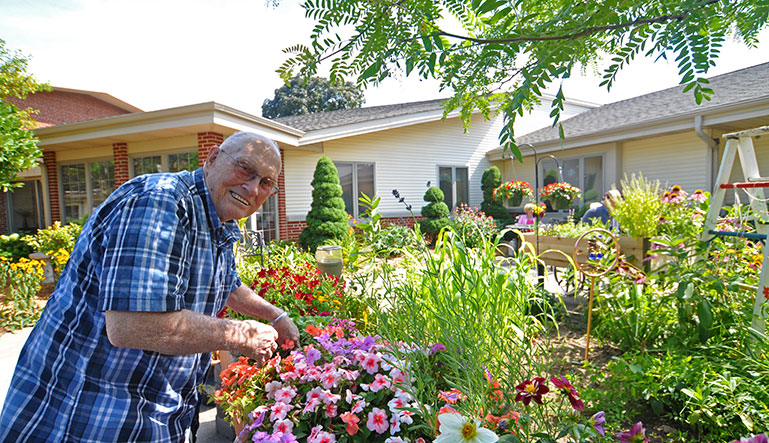Finding meaningful activity for adults with Alzheimer’s or other types of dementia helps make the days feel productive and purposeful. It improves self-esteem and gives a sense of independence. Gardening is one such activity.
Gardening reaps many health benefits, especially for people with a memory impairment. Planting and nurturing flowers and vegetables calms the mind while boosting the spirit. Gardening also helps the senior maintain core strength and balance, both of which are key for preventing falls.
Gardens that stimulate the senses through aromatherapy can be of special interest to adults with dementia. These are known as sensory gardens.
How to Plant a Sensory Garden for Dementia Patients
Aromatherapy has long been used in memory care communities as a tool for elevating mood, increasing appetite, improving sleep, and more. Sensory gardens can offer similar benefits. The smell of roses and peonies can be a reminder of pleasant times. Many find the texture of herbs like rosemary or lavender soothing to touch.
Sensory experiences like these can trigger memory centers in the brain. It may help the senior reconnect with memories the disease has stolen. If you aren’t sure how to start a sensory garden, this step-by-step outline can be useful:
- Find a space: A sensory garden doesn’t have to be very large. You can even set one up in containers on a porch or patio. Just make sure the spot you choose is secure and accessible for your senior loved one. A location with neighborhood distractions might encourage wandering, so keep that in mind.
- Monitor light: Watch the area you’ve designated for your garden to see how much and what type of light it receives in a typical day. Is it in direct sunlight? Or is it more on the shady side? This will determine what types of flowers and vegetables will thrive in your sensory garden.
- Choose plants: Once you know how much shade or sun your garden will receive, you can start choosing what goes there. You and your senior loved one can search online to find fragrant flowers and herbs or enticing vegetables. Once you have a list, make sure each plant isn’t toxic if ingested.
- Invest in good soil: Inexperienced gardeners may underestimate the role soil plays in a thriving sensory garden. A garden center is usually the best place for advice on local soil conditions. Call one near you to find out what you need. If your sensory garden will be planted in the ground versus in containers, call your county extension offices to inquire about soil testing. They will ensure you are planting in good dirt or offer suggestions for amending the soil.
- Purchase plants safely: If you are trying to avoid crowds or new places to reduce overstimulation or confusion, find a local greenhouse or garden center that offers curbside pickup. You may also be able to have the plants shipped directly to your doorstep from an online nursery.
- Read plant markers: A marker with directions is typically included with each plant. Make sure you save and follow the directions for each type of plant. It can help you and the senior determine how often to water and fertilize.
Depending upon the climate you live in, a sensory garden can encourage more quality time with your older loved one.
Memory Care at Five Star Senior Living
Gardening is just one of many activities you’ll find at Five Star Senior Living communities across the country. If you are searching for memory care for a senior in your life, we invite you to consider Five Star Senior Living.

